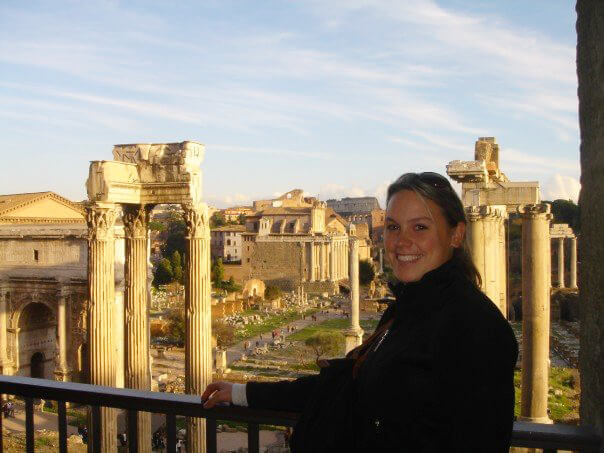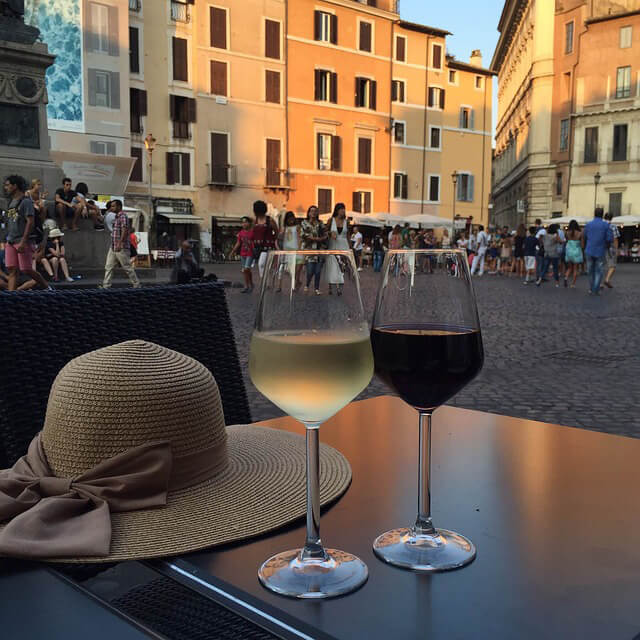A Journey of Self-Discovery as a Student in Rome
How to Understand Cultural Differences Through Study Abroad
by Kristen Clark

|
The author in front of the Roman Forum (taken from the Capitoline Museum).
Photo by Kristen Clark.
|
"No, non fare così!" (No, don't do it like that!). The driver held a cigarette in his fingers and gestured endlessly with his hands. The older man responded, his hands cupped in front of his chest, shaking them up and down, while his shoulders tensed up — a classic Italian gesture. “Aspetta, aspetta” (Wait, wait). Five American girls stood watching the Italians gesticulating wildly and exchanging suggestions while attempting to fit the luggage in a small white van. The men handled the bags rather awkwardly — they took them out, pushed them in, turned them around, and then slammed the door so they stayed in the car. Finally! We were ready to leave Fiumicino, the main airport of Rome, Italy. The driver weaved through traffic while sending text messages and looking in the mirror, eyes rarely on the road. Five American girls were in the back, strangers to each other at that moment, but already bonded by this scary yet funny incident. We clutched the van's sides, hoping to reach the apartment safely. This was our first experience in Rome. It involved confusion, doubts, comedy, and, for me, an itching desire to become wholly immersed — to live like a Roman, be surrounded by Italians, and learn about il bel paese, Italia.
Study in Rome
I studied abroad in Rome. When I first arrived, I had no idea how much my time in Italy would affect me. As a history major, I always kept the following maxim in my mind: "The past is like a foreign country." So, adjusting to a new culture would be a piece of cake if I could study and understand history. Although living in a different country was not always easy, I learned, adjusted, and left entirely changed by my experiences. I was uncertain of myself in the first two years of college, asking questions such as: "Where do I fit in?" "What kind of person am I becoming?" "What will I do after college?" I found myself in Rome — with all my passions, needs, and future goals. I experienced an enthusiasm for travel, cultural immersion, and, above all else, the close relationships I had formed with my Italian friends. In becoming immersed in a foreign country, you can look in on yourself and discover what truly matters in your life, away from the biases that America, family, or friends press upon you. To go abroad means to get away from those outside influences.
Studying in Western Europe has recently made it too easy to remain surrounded by material reminders of America, which some in Europe find conflicts with their traditions. Not only can you find a McDonald's or Burger King in every major city, but even the tourist attractions and well-known nightspots are generally geared toward American visitors. I know of students who have gone to Italy and decided to stay in the comforts of American culture — they hang out in large groups, go to the same American nightspots, and refuse to rid themselves of their preconceived impressions of Italians. Yet, even with a limited knowledge of another language, it is possible to break through the barrier and truly become immersed. For me, this is the most essential aspect of studying abroad.
The first weekend in Rome, my roommates and I noticed a group of young Italians who hung out at the piazza between our apartment and the bus stop. Instead of walking by every day, hurrying up the hill to avoid being stared at, two of my roommates and I decided to introduce ourselves. We quickly learned that they did not speak much English, but we were curious about our new Roman neighbors, and they were curious about us as well. Having completed two years of college-level Italian, I was ready to put my skills to use. Through broken English and Italian, we could communicate and form strong friendships.
Almost every night, my roommates and I walked down to the piazza. "Fabio!" "Amore!" "Occhi Verdi!" (Green eyes) — I shouted as we entered the piazza each night. Fabio responded, a smile ear-to-ear, "Amore!" In a strong Italian accent, Stefano yelled, "Eh, American girls!" My roommate would answer, "Eh, Ragazzi Italiani!" (Italian boys). For hours, we stood around several Vespas, listening to the gossip of our Roman friends. Claudia usually critiqued our outfits as Fabio recited lines from popular Italian-American movies such as "Scarface" and "The Godfather." My roommates and I spoke Italian as much as possible, and in time we improved. As the semester progressed, we began talking about universally common subjects — relationships, family, music, and sports — and became part of the crew that hung out at Piazza di Donna Olimpia.

|
|
A café in Rome, where you can enjoy espresso or wine while observing the street scenes.
|
Adapting to Rome Through Immersion
Constantly surrounded by my new Italian friends, I learned not to stick out as an American. I lived by the motto, "When in Rome." One night, I was a little disappointed to overhear Alessandro's cousin talking about my choice of shoes. We were standing in a little café when she began talking about how Americans never seem to dress appropriately for the weather.
I eventually let her know I could understand Italian. I explained that by my standards, the temperature of Rome in late October is still warm enough for sandals. Nonetheless, I retired my sandals until the spring. To further blend in, I never ordered a cappuccino after the morning hours. Italians enjoy caffé (espresso) throughout the day, but cappuccino is only for breakfast. Another colpa mia came about when two of our Italian friends took my roommate and me out to dinner. We both ordered pasta meals and promptly received strange looks from across the table. According to Stefano and Simone, girls usually eat pasta for lunch and meat for dinner.
The hardest Italian custom to adapt to was the mid-afternoon break or siesta. Since I lived outside the city center, in Monteverde, most stores, pharmacies, and even restaurants close from anywhere between 2:00 p.m.- 5:00 p.m. This time is reserved for a large afternoon meal, so the streets were almost completely deserted within those hours. Another inconvenient practice in Rome is the sciopero, or strike. Public transportation declares a scheduled time to stop services every few weeks, making it virtually impossible to get around the city. As frustrating as the siesta and sciopero are to us Americans, they reflect a popular Italian expression: il dolce far niente (the sweetness of doing nothing). What a great motto! For me, it gives a romantic feeling to Italy. It is a welcome escape from too many Americans' fast-paced and demanding lives.
In adjusting to a new culture, you must consider your customs. Trivial matters like not finding milk sold by the gallon, hanging dry laundry, or eating dinner as late as 10:00 p.m. — even these become massive transformations. Self-reflection becomes natural when removed from what is expected. Ordering a large soda in Italy would be equivalent to a small size in the United States; why must serving sizes be so big? Italians taking their coffee on the go is unheard of; why do most Americans need to drink their coffee from a Styrofoam cup while rushing to work? Through these questions, I discovered why cultural immersion is so important: You gain respect for the differences of other customs and an awareness of the familiarity of your own. Experiencing differences in different cultures allows us to reflect on our own customs. I think that Americans should be more curious about the outside world. Life goes on outside the confines of the United States. There is so much to discover about our world beyond the topics related to capital gain and politics. It is essential to find out what others enjoy doing in their free time, what foods they enjoy eating, what future goals keep them going, and what values are closest to their hearts. Becoming curious about others in basic matters will bring a richer understanding of the world. What makes this world exciting and worth exploring is the universal nature of human beings. Adjusting to and accepting differences is where we eventually find commonality.
Self-Discoveries in Rome
I had hoped that my experience abroad would allow me to escape from my American life and discover things about Italians, even Romans, that cannot be found in a book. At first, my desire to meet Italian friends was about delving into the realities of their lives, finding out what they enjoy doing, their political beliefs, and their life goals. However, I realized that my experience abroad was about finding myself. I entered Rome to connect with Italian life — which I did as fully as possible during the time — and still left with a more profound self-awareness.
I want to continue discovering the world through travel and educate others about the importance of cross-cultural studies. After college, I plan to return to Italy or anywhere in Europe to teach English as a foreign language. Europe is my first step, and maybe Asia next. While studying abroad, I found that what drives me is the need to better understand the world and the billions of people who share it.
As a history major, I understand the cliché quote: "The past is like a foreign country." Knowledge of different customs, beliefs, and lifestyles is the key to understanding history and other nations. I fully grasped the maxim while standing in the Ancient Roman Forum, looking around the ruins, towards the Colosseum, and up to street level at the frantic traffic of the modern city. It is a city with over two thousand years of history meeting the demands of the twenty-first century — yesterday and today collide gracefully in Rome. If Rome can find a balance between the past and present, can there be the same coexistence of cultural differences? I hope so.
Kristen Clark was born and raised in Marblehead, Massachusetts. Kristen decided to minor in Italian after studying abroad in Rome with ISA at the American University of Rome. While abroad, she also traveled to Munich, Dublin, London, Amsterdam, Barcelona, and several other locations within Italy. Immediately after college Kristen would love to have the opportunity to teach English in Italy. If and when the desire to live in Europe subsides, she would like to go to graduate school for journalism.
|
